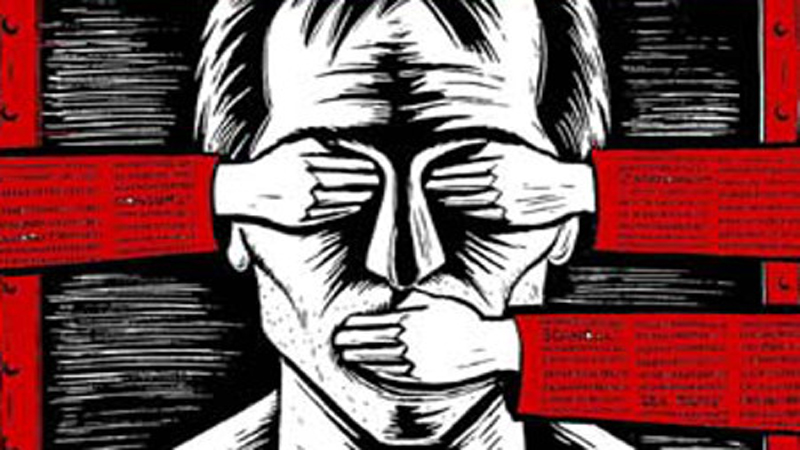
The British Broadcasting Corporation (BBC) recently acknowledged the practice of hiring journalists vetted by MI5, the UK intelligence agency, to keep out the “subversives”.
The CIA is believed to have driven American investigative reporter Gary Webb to suicide after he exposed the agency’s use of drug deals to fund Contra rebels in Nicaragua.
American researcher Joseph Overton has described a spectrum from “more free” to “less free”, known as the Overton Window, with regard to the US government intervention in the media.
Here’s how American philosopher Noam Chomsky has explained the US establishment’s media management strategy: “The smart way to keep people passive and obedient is to strictly limit the spectrum of acceptable opinion, but allow very lively debate within that spectrum.”
It seems that “free speech” in the West is really not so free.
MI5 Vetting of BBC Staff
The BBC recently acknowledged its long relationship with the British security establishment that started in 1933. When questions were asked about it, the BBC policy was to “keep head down and stonewall all questions”.
Vetting by the MI5 applied to all new BBC staff except “personnel such as charwomen”. Since the start of the policy, journalists were always subject to vetting, but a “review in 1983 resulted in about 2,000 posts being removed from the list – including some junior editorial jobs – bringing the total number down to 3,705″.
When asked whether any staff are vetted these days, a BBC spokesperson responded:”We do not comment on security issues”.
CIA and Media
In the course of investigating US CIA’s support of Contra rebels in Nicaragua, American journalist Gary Webb discovered a drug connection. He found that the CIA was trafficking drugs sold in poor African American neighborhoods to fund Contra rebels in war against Nicaragua’s Sandinista government in 1980s. Webb published his findings in a 3-part report “The Dark Alliance” carried by his employer San Jose Mercury News.
Webb’s report provoked outrage among African Americans for the harm it did by promoting drug addiction in their poor neighbourhoods. It became a public relations nightmare for the CIA.
The CIA responded to the crisis by using what Nicholas Dujmovic, a CIA Directorate of Intelligence staffer described as “a ground base of already productive relations with journalists.” The CIA top brass was overjoyed to see the nation’s largest newspapers destroy the reputation of Gary Webb that eventually led to his suicide.
Veteran journalist Carl Bernstein, famous for his reporting on Watergate along with Bob Woodward, investigated CIA’s use of the American media and wrote a piece describing “How Americas most powerful news media worked hand in glove with the Central Intelligence Agency and why the church committee covered It up”. Here’s what he said:
“Among the executives who lent their cooperation to the Agency were William Paley of the Columbia Broadcasting System (CBS), Henry Luce of Time Inc., Arthur Hays Sulzberger of the New York Times, Barry Bingham Sr. of the Louisville Courier‑Journal, and James Copley of the Copley News Service. Other organisations which cooperated with the CIA include the American Broadcasting Company (ABC), the National Broadcasting Company (NBC), the Associated Press (AP), United Press International (UPI), Reuters, Hearst Newspapers, Scripps‑Howard, Newsweek magazine, the Mutual Broadcasting System, the Miami Herald and the old Saturday Evening Post and New York Herald‑Tribune”.
Overton Window
American researcher Joseph P. Overton said that ideas may range a spectrum from “more free” to “less free” with regard to government intervention. The mainstream media, particularly commercial media, tend to limit the public discourse within the range they define as permissible at any given time. This is done by designing editorial policies.
The Overton window is not static. It is guided by what is seen as vital national interest by the US national security establishment as we saw during the Cold War and subsequently in the “war on terror”.
Social Media
Social media have created new media management challenges for the western security establishment as we saw with Brexit and Trump victory in 2016. It has created an outrage that is likely to result in new social media regulations unless the likes of Facebook and Twitter agree to self-censorship.
There’s so much pressure on major social media platforms that Facebook founder Mark Zuckerberg was forced to acknowledge regulation as “inevitable”.
“The internet is growing in importance around the world in people’s lives and I think that it is inevitable that there will need to be some regulation,” said Zuckerberg to a US Congress committee at a recent hearing.
The western security establishment will now make sure that the new social media platforms are tamed to stay within the “Overton Window” just like the legacy electronic and print media.